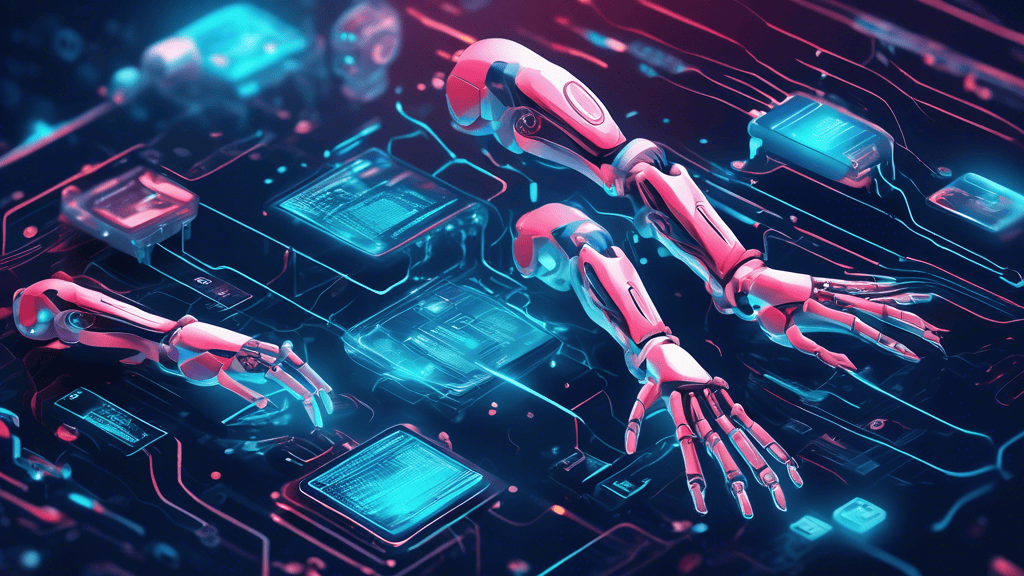Artificial intelligence tools are at the forefront of technological advancement, reshaping how we approach challenges and streamline processes. These innovative solutions not only enhance efficiency but also open new avenues for creativity and problem-solving. Staying informed about the latest ai tools is crucial for businesses and individuals alike, as the rapid evolution of technology can significantly impact productivity and competitiveness.
In this article, I’ll explore the key features of the latest new AI tools, diving into their intelligent automation capabilities, improved user experiences, and the ethical considerations that come with their implementation. I’ll also provide insights into future prospects for these tools, highlighting industries poised to benefit from cutting-edge advancements. Join me as we examine the transformative potential of new ai tools and understand their role in driving progress across various sectors.
## Introduction to New AI Tools
Understanding what new ai tools are and their significance is essential in today’s fast-paced tech environment. These tools consist of software and applications leveraging artificial intelligence to perform tasks that typically require human intelligence. This can include recognizing speech, making predictions, analyzing data, and even automating complex processes.
### Definition and Overview of AI Tools
ai tools specifically refer to technologies that utilize algorithms and machine learning to improve efficiency, enhance decision-making, and create smarter solutions. They can range from simple applications, like chatbots designed for customer service, to complex systems, such as predictive analytics platforms used in healthcare and finance. Key characteristics of ai tools include:
– **Automation:** Many ai tools automate repetitive tasks, freeing up human resources for more critical work.
– **Data analysis:** AI can comb through vast data sets to uncover trends, insights, and actionable information.
– **Learning capabilities:** As they process more data, ai tools can become more effective over time, refining their outputs and improving accuracy.
### Importance of Staying Updated with the Latest Technologies
With the rapid development of new AI tools, staying informed is crucial for individuals and businesses. Here are a few reasons why keeping up with these advancements matters:
– **Competitive edge:** Companies that adopt ai tools quickly can achieve higher productivity and efficiency, staying ahead of competitors.
– **Adaptation to market changes:** Rapidly changing consumer preferences and market conditions require businesses to be agile. ai tools can provide insights that allow for swift changes in strategy.
– **Innovation drive:** New ai tools often lead to revolutionary services and products, making it vital for users to know the latest offerings to leverage their capabilities fully.
### Brief Preview of Emerging Trends in the AI Landscape
Several exciting trends are shaping the future of new AI tools. Here are a few to watch for:
– **Natural language processing advancements:** Improvements in understanding and generating human language will lead to better interactions between humans and machines.
– **AI democratization:** User-friendly ai tools are emerging, making powerful technology accessible to smaller companies and individuals without extensive technical expertise.
– **Focus on ethics:** Emerging tools increasingly emphasize responsible AI usage, ensuring that innovations consider societal impacts and user privacy.
As new ai tools continue to emerge, the landscape will undoubtedly evolve, providing innovative solutions and opportunities for individuals and businesses alike.

Key Features of the Latest New AI Tools
Intelligent Automation Capabilities
Intelligent automation is a standout feature of the latest new AI tools, enabling significant improvements in workflow efficiency. By leveraging machine learning and advanced algorithms, these tools automate complex tasks and processes, resulting in considerable time and resource savings.
Streamlining Workflows and Productivity
New ai tools excel at streamlining workflows. They analyze existing processes and identify inefficiencies, allowing businesses to automate repetitive tasks. This leads to faster decision-making and minimizes human error. Industries such as manufacturing, healthcare, and finance witness remarkable improvements in productivity when applying intelligent automation.
Real-World Applications Across Industries
Different sectors are utilizing these tools in diverse ways:
– **Manufacturing**: ai tools control machinery and streamline production lines, reducing downtime and optimizing resource allocation.
– **Retail**: Automation in inventory management and customer service enhances overall operational efficiency.
– **Healthcare**: Intelligent automation assists with patient record management and appointment scheduling, allowing healthcare professionals to focus on patient care.
Enhanced User Experience and Interface
User experience remains a priority for technology developers. The latest new ai tools feature enhanced interfaces that simplify interactions and make them more intuitive.
Customizable Solutions for Various Business Needs
Customization is key. These tools offer tailored solutions that can adapt to specific business requirements. Whether you’re a startup or an established enterprise, you’ll find tools that fit your needs. Features allow businesses to adjust settings, dashboards, and reporting tools, making AI toolset versatile across varying industries.
Integration with Existing Systems
Seamless integration of new ai tools with existing systems is crucial. Businesses often rely on established software solutions, so the ability to integrate ai tools without disrupting workflows is essential. Most AI platforms now support tools that integrate effortlessly with popular software like CRM systems, ERP platforms, and productivity suites. This capability ensures that companies can leverage new technologies while preserving their established workflows.
Ethical Considerations and Responsible AI Use
As AI technology advances, so do the ethical considerations surrounding its use. The latest tools place significant emphasis on promoting responsible AI practices to ensure innovation aligns with ethical norms.
Balancing Innovation with Ethical Implications
Balancing innovation with ethical implications is paramount for developers and users alike. There’s growing awareness of the potential consequences of biased algorithms and data misuse. The best new ai tools come with built-in features that help address these concerns. They are programmed to factor in ethical standards in their algorithms, encouraging responsible usage.
Tools Promoting Transparency and Accountability
Transparency and accountability are essential in fostering an environment of trust when using AI tools. Emerging solutions offer features that document decision-making processes and provide insights into how data is used. This ensures users can trace back actions to understand underlying algorithms’ reasoning.
Adopting new ai tools with a focus on these ethical aspects can significantly enhance a company’s reputation while ensuring compliance with legal standards. Developing a culture that emphasizes responsible AI use can lead to innovation that is beneficial for society at large.
The latest new ai tools don’t just mark a technological leap; they also pose thoughtful questions about how we engage with the capabilities of these systems. The focus on automation, user experience, integration, and ethical considerations sets the stage for businesses to evolve and adapt in a rapidly changing landscape.

Future Prospects for New AI Tools
Predicted advancements in AI technologies
The future of new ai tools promises significant advancements that could transform how we interact with technology. Innovations on the horizon include improved natural language processing, more efficient machine learning algorithms, and enhanced data processing capabilities. Here are some trending predictions:
– **Augmented Reality Integration**: Expect ai tools to merge seamlessly with augmented reality, offering hands-on training simulations and immersive experiences that engage users on multiple levels.
– **Adaptive Learning Systems**: These ai tools will shape their functions based on user feedback and data patterns, making them smarter and more efficient over time.
– **Greater Accessibility Features**: ai tools will increasingly prioritize inclusivity, offering advanced speech recognition and visual aids to support users with disabilities.
– **Hyper-Personalization**: Tailoring the user experience will become more refined, allowing businesses to implement AI that respects individual preferences and behaviors, leading to a more customized interaction.
– **Robust Predictive Analytics**: Future ai tools will leverage advanced algorithms to forecast trends and user needs, enabling proactive decision-making in various sectors.
Industry sectors likely to benefit most from new AI tools
Various industries stand to gain substantially from the rollout of new AI tools. Some sectors that are already seeing substantial changes include:
– **Healthcare**: The integration of AI in healthcare, from predictive diagnostics to patient management systems, is revolutionizing patient care. New ai tools are aiding in faster diagnosis, personalized treatment plans, and better resource management.
– **Finance**: In the financial sector, AI is optimizing fraud detection, enhancing customer service through chatbots, and facilitating high-frequency trading with precise market predictions. Tools utilizing machine learning will continue to improve risk assessment and investment strategies.
– **Retail**: Retailers are using AI to analyze consumer behavior and optimize inventory management. New ai tools are helping businesses personalize marketing efforts, predicting consumer needs more accurately.
– **Manufacturing**: Automation and predictive maintenance powered by AI are enhancing manufacturing efficiency. Tools in this space monitor equipment health, predict failures, and streamline operations.
– **Education**: ai tools are transforming education through personalized learning experiences, automating administrative tasks, and providing advanced analytics to improve student outcomes.
The rapid development of ai tools indicates that sectors willing to adapt will enjoy a competitive edge. Other industries, including transportation and agriculture, will also benefit as they adopt these advanced technologies.
Incorporating New AI Tools
For businesses looking to adopt new AI tools, several strategic steps can facilitate a smooth transition:
– **Assess Current Needs**: Identify specific pain points or goals your organization aims to address. This assessment will help you select the most suitable ai tools for your operations.
– **Pilot Programs**: Before widespread implementation, consider launching pilot programs to test selected ai tools within a smaller framework. This allows for evaluation and adjustments based on initial findings.
– **Staff Training**: Investing in training ensures your team can leverage the full potential of new AI tools. Encourage a culture of digital literacy and continuous learning as these technologies evolve.
– **Measure Performance**: Establish metrics to assess the impact of the ai tools on productivity and efficiency. This feedback loop will help refine the use of AI in your organization.
Eventually, investing in new ai tools can improve workflows, customer engagement, and overall business performance.
Embracing the Shift Towards AI
As we advance into an era marked by rapid technological growth, embracing new ai tools will become essential for organizations aiming to thrive. These tools not only streamline processes but can also foster innovation and creativity. Staying abreast of developments and being open to integration are crucial elements for future success. Adopting ai tools is not merely a trend; it’s a strategic move towards future-proofing your business. Regularly exploring the latest advancements will keep you ahead, ensuring you harness the benefits of these evolving technologies without falling behind.
Their complexity may seem overwhelming, but understanding how new ai tools can serve your needs will pay off. I encourage you to keep an eye on the latest technologies, experiment with new solutions, and engage in discussions with experts in the field. This proactive approach will enhance both your personal growth and your organization’s adaptability, paving the way for a successful future in an AI-driven landscape.
The exploration of new ai tools reveals an exciting future for technology and various industries. As artificial intelligence continues to evolve, it’s essential to stay updated with the latest advancements to harness their potential fully. The intelligent automation capabilities of these tools streamline workflows, enhancing productivity across numerous sectors. The emphasis on user experience means that businesses can now find customizable solutions that fit their unique needs, seamlessly integrating these tools into existing systems.
However, as we embrace these advancements, it’s crucial to consider the ethical implications that arise. Responsible AI use should promote transparency and accountability to ensure that innovation does not compromise ethical standards. Future prospects for new ai tools indicate significant advancements that could reshape industries, unlocking new efficiencies and capabilities.
I encourage you to explore these developments further and consider how new ai tools can benefit your organization or personal endeavors. Staying informed about emerging trends ensures that you’re well-prepared to leverage AI’s potential for achieving outstanding results.
